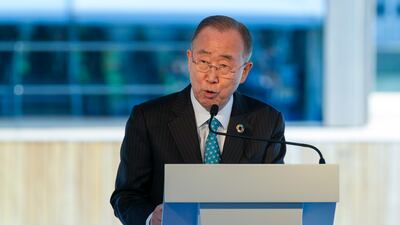Leaders on Monday called for more money and political will to help people adapt to global warming after last month's warning from the UN climate science panel that extreme weather and rising seas are occurring faster than expected.
At a forum in Rotterdam convened by the Global Centre on Adaptation, more than 50 ministers and heads of climate organisations and development banks called for November's Cop26 climate talks to treat adaptation as "urgent".
They said adaptation, from building taller flood defences to growing more drought-tolerant crops and relocating coastal communities, had not been given the same attention, resources or level of action as efforts to cut planet-heating emissions.
That has left communities worldwide "exposed to a climate emergency unfolding faster than predicted", they said.
"Adaptation can no longer go under-prioritised," they said in a communique. "It is imperative for Cop26 to launch an acceleration in adaptation efforts to enable the world to keep pace with this most profound and far-reaching emergency."
They said the Cop26 summit, to be hosted in Scotland, would not succeed unless it gave adaptation equal priority to cutting carbon emissions.
Those at the Rotterdam meeting included former UN secretary general Ban Ki-moon, UN climate chief Patricia Espinosa and International Monetary Fund managing director Kristalina Georgieva.
They heard from representatives of African nations, small developing island states and other countries vulnerable to climate change.
They spoke of how communities are struggling with unusually severe flooding, drought and storms, and the Covid-19 pandemic.
Those crises set back hard-won development and uprooted people into city slums or across national borders as it became untenable to survive on their land.
“We are now living in the eye of the storm," Patrick Verkooijen, chief executive of the Global Centre on Adaptation, told the opening of the forum.
"Adapting the world to our climate emergency is essential for our safety, even as we tackle a global pandemic.
"Millions of lives and the safety of communities around the world are already at stake."
Those attending called for an urgent increase in international funding to help finance adaptation in poorer nations, which have long suffered from a lack of cash.
UN Deputy Secretary General Amina Mohammed highlighted the need for "massively scaled-up investment in adaptation and resilience", which she said was "absolutely critical for those at the frontlines of the climate crisis".
Ms Mohammed said only about a fifth of climate finance has been allotted to adaptation and "only a fraction" of the estimated $70 billion that developing countries need now to cope with the effects of global warming was being provided.
Wealthier countries are under pressure to set aside half of their climate finance for adaptation.
But more than a decade after they pledged to put funding for it and emissions reductions on an equal basis, the adaptation share remains stubbornly low, partly because much of it needs to be given as grants, not loans.
Ms Espinosa said on Twitter on Monday that at least 125 of 154 developing countries had started work on adaptation plans.
She and Mr Ban, who is chairman of the Global Centre on Adaptation, said much larger amounts of funding were needed to put those plans into practice.
Ms Georgieva, who chaired Monday's meeting, said the IMF was discussing with its member countries channelling some of the money they received from a recent allocation of special drawing rights into a new Resilience and Sustainability Trust to help vulnerable nations adapt to climate change.


